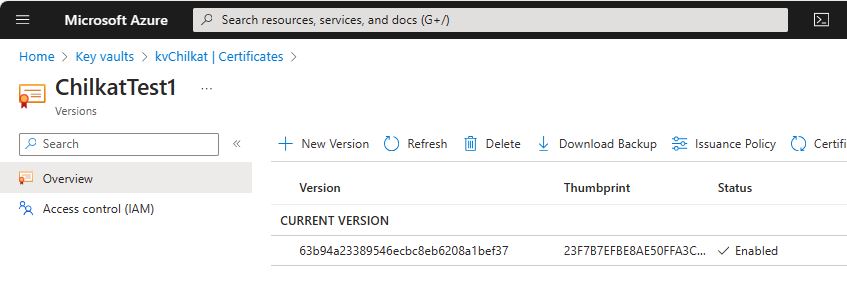|
|
(PowerBuilder) Create CAdES p7m using Azure Key Vault to Sign in the Cloud
Demonstrates how to create a CAdES p7m, using Azure Key Vault. The signing of the hash happens in the Cloud on Azure Key Vault. Everything else regarding the creation of CAdES happens locally within Chilkat.
Note: This example requires Chilkat v9.5.0.96 or greater.
integer li_rc
oleobject loo_Cert
integer li_Success
oleobject loo_JsonAzure
oleobject loo_Crypt
oleobject loo_SignedAttrs
string ls_InputXmlPath
string ls_OutputP7mPath
// This example assumes the Chilkat API to have been previously unlocked.
// See Global Unlock Sample for sample code.
// Load the certificate used for signing. The certificate's private key is stored in
// the Azure Key Vault.
// However, we still need the certificate locally (without private key).
loo_Cert = create oleobject
// Use "Chilkat_9_5_0.Cert" for versions of Chilkat < 10.0.0
li_rc = loo_Cert.ConnectToNewObject("Chilkat.Cert")
if li_rc < 0 then
destroy loo_Cert
MessageBox("Error","Connecting to COM object failed")
return
end if
li_Success = loo_Cert.LoadFromFile("qa_data/certs/myCert.cer")
if li_Success = 0 then
Write-Debug loo_Cert.LastErrorText
destroy loo_Cert
return
end if
// Here's a screenshot of our certificate with private key on Azure Key Vault:
 // To sign using the Azure Key Vault,
// add the following lines of code to specify your authentication credentials,
// and the name of the certificate w/ private key on the Azure server to be used.
loo_JsonAzure = create oleobject
// Use "Chilkat_9_5_0.JsonObject" for versions of Chilkat < 10.0.0
li_rc = loo_JsonAzure.ConnectToNewObject("Chilkat.JsonObject")
// Set the "service" equal to "azure_keyvault" to tell Chilkat to use Azure Key Vault for signing.
loo_JsonAzure.UpdateString("service","azure_keyvault")
loo_JsonAzure.UpdateString("client_id","APP_ID")
loo_JsonAzure.UpdateString("client_secret","APP_PASSWORD")
loo_JsonAzure.UpdateString("tenant_id","TENANT_ID")
// In the above screenshot, our vault name is "kvchilkat". You will use your vault name.
loo_JsonAzure.UpdateString("vault_name","VAULT_NAME")
// In the above screenshot, our cert name is "ChilkatTest1". You will use your cert name.
loo_JsonAzure.UpdateString("cert_name","CERT_NAME")
// In the above screenshot, our cert version is "63b94a23389546ecbc8eb6208a1bef37". You will use your cert version.
loo_JsonAzure.UpdateString("cert_version","CERT_VERSION")
li_Success = loo_Cert.SetCloudSigner(loo_JsonAzure)
loo_Crypt = create oleobject
// Use "Chilkat_9_5_0.Crypt2" for versions of Chilkat < 10.0.0
li_rc = loo_Crypt.ConnectToNewObject("Chilkat.Crypt2")
li_Success = loo_Crypt.SetSigningCert(loo_Cert)
if li_Success = 0 then
Write-Debug loo_Crypt.LastErrorText
destroy loo_Cert
destroy loo_JsonAzure
destroy loo_Crypt
return
end if
// The CadesEnabled property applies to all methods that create PKCS7 signatures.
// To create a CAdES-BES signature, set this property equal to true.
loo_Crypt.CadesEnabled = 1
loo_Crypt.HashAlgorithm = "sha256"
loo_SignedAttrs = create oleobject
// Use "Chilkat_9_5_0.JsonObject" for versions of Chilkat < 10.0.0
li_rc = loo_SignedAttrs.ConnectToNewObject("Chilkat.JsonObject")
loo_SignedAttrs.UpdateInt("contentType",1)
loo_SignedAttrs.UpdateInt("signingTime",1)
loo_SignedAttrs.UpdateInt("messageDigest",1)
loo_SignedAttrs.UpdateInt("signingCertificateV2",1)
loo_Crypt.SigningAttributes = loo_SignedAttrs.Emit()
// You can sign any type of file..
ls_InputXmlPath = "qa_data/e-Invoice.xml"
ls_OutputP7mPath = "qa_output/signed.p7m"
// Create the CAdES-BES attached signature, which contains the original data.
// Chilkat will build the .p7m locally, but will (internally) use ARSS
// to do the RSA signing remotely.
li_Success = loo_Crypt.CreateP7M(ls_InputXmlPath,ls_OutputP7mPath)
if li_Success = 0 then
Write-Debug loo_Crypt.LastErrorText
destroy loo_Cert
destroy loo_JsonAzure
destroy loo_Crypt
destroy loo_SignedAttrs
return
end if
Write-Debug "Success."
destroy loo_Cert
destroy loo_JsonAzure
destroy loo_Crypt
destroy loo_SignedAttrs
// To sign using the Azure Key Vault,
// add the following lines of code to specify your authentication credentials,
// and the name of the certificate w/ private key on the Azure server to be used.
loo_JsonAzure = create oleobject
// Use "Chilkat_9_5_0.JsonObject" for versions of Chilkat < 10.0.0
li_rc = loo_JsonAzure.ConnectToNewObject("Chilkat.JsonObject")
// Set the "service" equal to "azure_keyvault" to tell Chilkat to use Azure Key Vault for signing.
loo_JsonAzure.UpdateString("service","azure_keyvault")
loo_JsonAzure.UpdateString("client_id","APP_ID")
loo_JsonAzure.UpdateString("client_secret","APP_PASSWORD")
loo_JsonAzure.UpdateString("tenant_id","TENANT_ID")
// In the above screenshot, our vault name is "kvchilkat". You will use your vault name.
loo_JsonAzure.UpdateString("vault_name","VAULT_NAME")
// In the above screenshot, our cert name is "ChilkatTest1". You will use your cert name.
loo_JsonAzure.UpdateString("cert_name","CERT_NAME")
// In the above screenshot, our cert version is "63b94a23389546ecbc8eb6208a1bef37". You will use your cert version.
loo_JsonAzure.UpdateString("cert_version","CERT_VERSION")
li_Success = loo_Cert.SetCloudSigner(loo_JsonAzure)
loo_Crypt = create oleobject
// Use "Chilkat_9_5_0.Crypt2" for versions of Chilkat < 10.0.0
li_rc = loo_Crypt.ConnectToNewObject("Chilkat.Crypt2")
li_Success = loo_Crypt.SetSigningCert(loo_Cert)
if li_Success = 0 then
Write-Debug loo_Crypt.LastErrorText
destroy loo_Cert
destroy loo_JsonAzure
destroy loo_Crypt
return
end if
// The CadesEnabled property applies to all methods that create PKCS7 signatures.
// To create a CAdES-BES signature, set this property equal to true.
loo_Crypt.CadesEnabled = 1
loo_Crypt.HashAlgorithm = "sha256"
loo_SignedAttrs = create oleobject
// Use "Chilkat_9_5_0.JsonObject" for versions of Chilkat < 10.0.0
li_rc = loo_SignedAttrs.ConnectToNewObject("Chilkat.JsonObject")
loo_SignedAttrs.UpdateInt("contentType",1)
loo_SignedAttrs.UpdateInt("signingTime",1)
loo_SignedAttrs.UpdateInt("messageDigest",1)
loo_SignedAttrs.UpdateInt("signingCertificateV2",1)
loo_Crypt.SigningAttributes = loo_SignedAttrs.Emit()
// You can sign any type of file..
ls_InputXmlPath = "qa_data/e-Invoice.xml"
ls_OutputP7mPath = "qa_output/signed.p7m"
// Create the CAdES-BES attached signature, which contains the original data.
// Chilkat will build the .p7m locally, but will (internally) use ARSS
// to do the RSA signing remotely.
li_Success = loo_Crypt.CreateP7M(ls_InputXmlPath,ls_OutputP7mPath)
if li_Success = 0 then
Write-Debug loo_Crypt.LastErrorText
destroy loo_Cert
destroy loo_JsonAzure
destroy loo_Crypt
destroy loo_SignedAttrs
return
end if
Write-Debug "Success."
destroy loo_Cert
destroy loo_JsonAzure
destroy loo_Crypt
destroy loo_SignedAttrs
|

